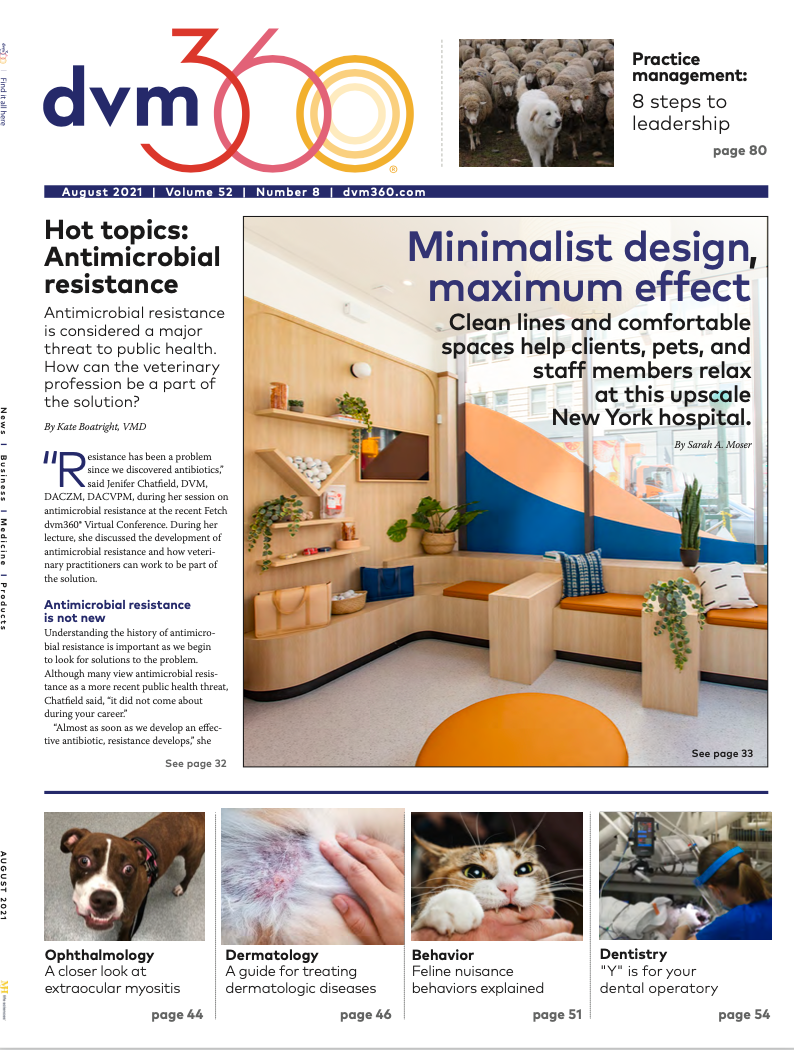Becoming unstoppable
Three veterinarians share inspiring advice on how to reach your full potential, plus offer insight into why self-care is so important.
According to Kimberly Ann Therrien, DVM, to become unstoppable, we must first take care of ourselves. During a lecture at the May Fetch dvm360® virtual conference, keynote speakers Therrien, along with Laura Pletz, DVM, and Sarah Wooten, DVM, CVJ, delved into different strategies and methods for fostering the best version of ourselves—from striving for healthy perfectionism to discovering the power of agency.
Aim for healthy perfectionism
“Perfection is a roadblock to success,” Therrien argued. Rather than attempting to be perfect, we should aim for some form of perfection. Though Therrien is by no means against having goals, she makes a distinction between what she considers healthy perfectionism and maladaptive perfectionism.
She explained that healthy perfectionism can be characterized by setting realistic and attainable goals for yourself and others, being resolute when faced with adversity, and having goal-driven behavior and organizational skills. Individuals who exercise this form of perfectionism typically balance and meet their expectations, and don't get stressed or upset when they don't fully achieve their goals.
Conversely, Therrien identified maladaptive perfectionism as setting unrealistic and unattainable goals, constantly ruminating over past mistakes, fear of making mistakes, having doubts about whether you're doing something correctly, and being incredibly anxious about the high expectations of others.
“Challenging ourselves is and can be a wonderful thing, as long as we set boundaries and don’t become obsessed with this urge to always be better, do more...or do it all,” she said. “At the end of the day, that is what creates maladaptive perfectionists because you set extremely high and unrealistic goals, quite frequently unachievable goals.”
Set boundaries for self-care
Therrien also touched on the importance of setting boundaries and how they impact not only the person establishing them but also everyone around them. If we don’t set boundaries, we can become angry or irritable. Ergo, boundaries are necessary for self-care.
“Many people view self-care as a luxury rather than a priority,” she said. "When you do not make this a priority, you find yourself overwhelmed, tired, or ill-equipped to handle some of life’s challenges and/or stressors.” She adds that self-care—whether it's physical, social, mental, spiritual, or emotional—is intentional, and people have to consciously decide to incorporate it into their lives.
Be aware of thoughts and feelings
Pletz offered attendees insights into how our feelings and thoughts affect our narratives, and how we mustn’t rely on emotionally charged cognitive distortions to keep ourselves from feeling drained. Some of these distortions include polarized thinking, mental filtering, overgeneralizing, jumping to conclusions, and catastrophizing.
She also encouraged listeners to express their feelings because it is both normal and healthy behavior, so long as a conscious effort is being made to not let the emotions turn into negative and distorted thoughts.
“We have these feelings that come upon us and then turn into thoughts that are based in judgments of ourselves and others and affect our moods,” leading us “to make more negative judgments, and those become part of our story, so you have this emotional baggage that you’re carrying around all the time,” she explained.
Instill agency
Building upon Therrien’s suggestions for self-care and Pletz’s for self-awareness, Wooten recommended incorporating agency into our lives as the next step to overcoming obstacles and being our best selves.
“Agency is the sense of control that you feel in your life, your capacity to influence your own thoughts and behaviors, and your faith in your ability to handle a wide range of tasks, situations, obstacles,” Wooten remarked. It is “your power, your ability, to affect the future.”
According to Wooten, agency is composed of self-reflection, intentionality, forethought, and self-reactiveness,1 and it allows us to make things happen in our lives, to produce our lives, rather than simply be its byproduct. When we understand and practice agency, we can reach our full potential.
References
- Bandura A. Agency. Albert Bandura. https://albertbandura.com/albert-bandura-agency.html. Published 2017. Accessed July 19, 2021.

